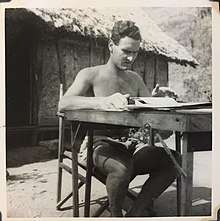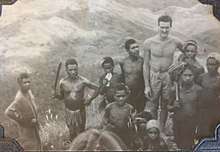Richard Frank Salisbury
Richard Frank Salisbury FRSC (December 8, 1926 – June 17, 1989), also known as Dick Salisbury, was a Canadian anthropologist, specializing in the field of Economic anthropology and anthropology of development. His primary fieldwork and subsequent publications dealt with the Tolai and Siane people of Papua New Guinea and the Cree of Northern Quebec.
Richard Frank Salisbury | |
|---|---|
 | |
| Born | December 8, 1926 London England |
| Died | June 17, 1989 (aged 62) Montreal, Quebec |
| Alma mater | |
| Occupation | Anthropologist |
| Spouse(s) | Mary Elizabeth Roseborough (1954) |
| Children | Thomas S., John W., Catherine E. |
| Awards | Killam Foundation Research Fellowship, 1980-1982 |
| Part of a series on |
| Economic, applied, and development anthropology |
|---|
|
Provisioning systems |
|
Case studies
|
| Social and cultural anthropology |
| Anthropology |
|---|
|
Key theories |
|
Lists
|
Salisbury was the founder of the McGill University Department of Anthropology, serving as its first chair (1966–1970).[1] He was the co-founder of McGill University's Centre for Developing Areas Studies.[2] He was the director of the Anthropology of Development program at McGill from 1970 – 1986 and finally Dean of the Faculty of Arts at McGill from 1986 to 1989.
He was a very prolific author. He was the author (or co-author) of 20 books, monographs and reports, more than 60 articles and numerous other reviews and commentaries. His most notable books are From Stone to Steel (1962),[3] Vunamami (1970)[4] and A Homeland for the Cree[5] (1986).
Salisbury served as an anthropological consultant. His leadership on the impact study of the James Bay Project helped the James Bay Cree and the Government of Quebec work out the historic treaty James Bay and Northern Quebec Agreement (1975) that has become a model for reconciling aboriginal autonomy with economic development.
Biography
Salisbury, the second of 3 children was born in London, England (Chelsea). His parents were Thomas Salisbury and Marjorie Beatrice (Smith) Salisbury. He served with the Royal Marines from 1945 to 1948 and simultaneously attended St John's College, Cambridge, in Cambridge, England, earning a Bachelor of Arts in 1949, specializing in Modern Languages.
In 1949, with a scholarship, he travelled to the United States and pursued his graduate work in the field of anthropology at Harvard University. He earned a MA degree from both Harvard University (1955) and University of Cambridge (1956). He studied anthropology at Cambridge with Meyer Fortes. He earned a PhD from Australian National University (1957), where he studied under Siegfried Frederick Nadel.
At Harvard University, he met Mary Roseborough, a Canadian who was doing her PhD in Sociology at Radcliffe College and was an assistant professor in Sociology at Tufts University. In 1954, they married in Toronto, Canada at the Walmer Road Baptist Church. Between 1957 and 1963, he and Mary had three children – Thomas, John and Catherine.
Salisbury died of renal cancer on June 17, 1989, and is buried at Mount Royal Cemetery, Montreal, Quebec. He died at age 62.


Career
Salisbury held a research position at the Harvard School of Public Health 1954–56, was an assistant professor at Tufts University, Boston, 1956–57 and an assistant professor at University of California at Berkeley, 1957–62.
In 1962, Salisbury moved to Montreal and joined the Department of Anthropology and Sociology at McGill University, where he stayed until the end of his career.
Salisbury was the founder of the McGill University Department of Anthropology, serving as its first chair (1966–1970).[1] He was the co-founder of McGill University's Centre for Developing Areas Studies.[2] He was the director of the Anthropology of Development program at McGill University from 1970 to 1986. Salisbury served as McGill University's Dean of The Faculty of Arts until his death (1986–1989).
He was a visiting professor at the University of Papua New Guinea in 1967 and 1984.
He was president of five anthropology associations including the Canadian Sociology and Anthropology Association (1968–1970), the Northeastern Anthropology Association (1968), the American Ethnological Society (1980), The Society for Economic Anthropology (1982). He was a member of the Royal Anthropological Institute and the American Anthropological Association.
He was a member of the academic panel Canada Council, 1974–1978; a member of the 1977 Quebec Commission on Higher Education, 1977–1979; served on the board of the Quebec Institute Research on Culture, 1979–1984, served on the board of the Canadian Human Rights Foundation from 1980.
He was a consultant to: Administrator Papua, 1971; Canadian Department of Agriculture, 1970; James Bay Development Corporation, 1971–1972; Indians of Quebec Association, 1972–1975; Communications Canada, 1974–1975; James Bay Energy Corporation, 1982; Garbe, Lahmeyer & Co., 1984.
Honours
"Crees believe that all honourable men belong to the same tribe. Salisbury was an honourable man" (Philip Awashish, Executive Chief of the Grand Council of the Crees of Quebec, Memorial service for F. Salisbury, September 28, 1989).[6]
Salisbury was elected to the Royal Society of Canada in 1974 and became Honorary Secretary of the Royal Society of Canada Academy of Humanities and Social Sciences.
He was awarded the prestigious Killam Foundation Research Fellowship for 1980–1982 [7]
Academic work
From 1952 to 1953, he did field work in the highlands of Papua New Guinea where he was the first anthropologist to live with the Siane people
Salisbury's main areas of field work and publication were:
- Economic changes amongst the Siane tribes of Papua New Guinea Highlands
- Economic development in a village in the Tolai area of New Britain, Papua New Guinea.
- Social changes of the Cree of Northern Quebec
During the James Bay Project, the Cree were displaced from their ancestral home and Salisbury's social impact studies were evidence that their hunting way of life was harmed by the flooding of rivers in their territory. The 1971–1981 study that Salisbury conducted was used by the Cree in their negotiations with the Quebec government.[8]
Selected publications
- From Stone to Steel: Economic Consequences of a Technological Change in New Guinea (1962)[3]
- Structures of Custodial Care : An Anthropological Study of a State Mental Hospital (1962)[9]
- Vunamami: Economic Transformation in a Traditional Society (1970) ISBN 9780520302983[4]
- A Homeland for the Cree: Regional Development in James Bay, 1971-1981 (1986) ISBN 9780773505513[5]
- Ethnography and Development: The Work of F. Salisbury, Marilyn Silverman, Richard F. Salisbury, Harvey A. Feit, Henry J. Rutz and Colin H. Scott. ISBN 9780773529502[10]
Legacy
The Canadian Anthropology Society awards The Richard F. Salisbury Student Award annually to a PhD Anthropology candidate, enrolled at a Canadian university, for the purposes of defraying expenses incurred while carrying out dissertation fieldwork. The winner of each award is also invited to present their preliminary findings to the annual meeting of the Canadian Anthropology Society/Société Canadienne d’Anthropologie.[11]
McGill University's Richard F Salisbury Prize in Anthropology – In memory of Dean Salisbury, founder of the McGill Department of Anthropology. Awarded annually by the McGill Faculty of Arts Scholarships Committee on the recommendation of the Department of Anthropology to a graduating or continuing Anthropology student who presents the best honours thesis or another research paper of comparable magnitude.[12]
Redpath Museum at McGill University has a permanent display of items from the Richard Salisbury Collection. The collection is of artifacts that Salisbury collected during his fieldwork in Papua New Guinea Highlands and in New Britain.
References
- Gadacz, René R. (20 October 2014). "Richard Frank Salisbury". The Canadian Encyclopedia. Retrieved 1 January 2020.
- "McGill University Newsletter – 1964".
- "From Stone to Steel: Economic Consequences of a Technological Change in New Guinea".
- "Vunamami: Economic transformation in a Traditional Society".
- "A Homeland for the Cree: Regional Development in James Bay, 1971–1981".
- Silverman, Marilyn (2004). "In Memoriam et Ad Futuram: The Anthropology of Richard F. Salisbury (1926–1989)" (PDF). In Silverman, Marilyn (ed.). Ethnography and Development: The Work of Richard F. Salisbury. McGill University Libraries. ISBN 9780773529502.
- "McGill University Research Honours".
- "Social Anthropology: Canadian Perspectives on Culture and Society by Edward Hedican".
- "Structures of Custodial Care : An Anthropological Study of a State Mental Hospital".
- "Ethnography and Development: The Work of Richard F. Salisbury".
- "Canadian Anthropology Society's Richard F Salisbury Student Award".
- "McGill University's Richard F Salisbury Prize in Anthropology" (PDF).